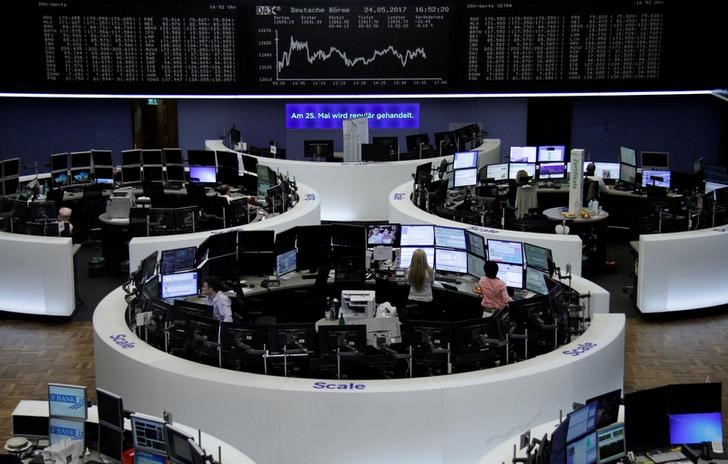By Vikram Subhedar and Jamie McGeever
LONDON (Reuters) - Europe's brightening economic prospects are unlikely to insulate regional stocks from any sharp pullback on Wall Street where a wobble last week heightened anxiety about whether a market at record highs is due a correction.
Darkening clouds in the United States contrast with an acceleration of the euro zone economy and an ebbing of political risk after this month's defeat for the anti-euro, far right in France's presidential elections.
Some analysts have wondered whether European stocks could 'decouple', or move independently, from the richly-valued S&P 500 (SPX) if it retreats significantly.
History shows this is unlikely.
"We're all in one boat. The world is a global village, whether we like it or not," said Burkhard Varnholt, deputy global chief investment officer at Credit Suisse (SIX:CSGN), which oversees 1.3 trillion Swiss francs ($1.33 trillion) of assets under management.
"If the U.S. slows down then it’s inevitable Europe is affected too, although the European economy is performing particularly well right now."
(For a graphic on tops companies' revenue exposure to the United States click http://reut.rs/2qm3rTI)
The S&P 500 (SPX) fell nearly 2 percent last Wednesday, the largest one-day loss since President Donald Trump was elected in November, on questions about his future and business-friendly economic agenda.
World stocks fell nearly 1.5 percent and European shares fell 1.2 percent the following day.
Over the past 30 years every instance of a month with a 5 percent or more drop on the S&P 500 was accompanied by a drop of at least as much on European stocks, according to Thomson Reuters data.
The same data shows several instances of large drops on European indices during months where the S&P 500 was unchanged or even higher.
More recent episodes of U.S. weakness, notably over the summer of 2015 and in January 2016 weakness, spread fast to global markets.
U.S. SETS THE DIRECTION
The reflation trade - bets on stocks that benefit from a pickup in growth and inflation such as banks and machinery makers - are still pinned to growth in the United States, the world's largest economy and a driver for global growth.
The United States accounts for more than 14 percent of the combined revenue of the developed world's biggest non-U.S. listed companies, a significant enough proportion to move the needle for investors should U.S. growth falter.
Top German and UK companies get nearly a fifth of their revenue from the United States. Japanese firms, led by the automakers, derive 14 percent of their revenue from the United States.
"It just comes down to working out whether the U.S. economy is moving forwards or backwards," said Kevin Gardiner, global investment strategist at Rothschild Wealth Management. "That sets the theme for global markets. The U.S. can set the direction for capital markets."
The U.S. equity market, now worth more than $20 trillion, is the combined size of the listed market values of the entire European and Asia-Pacific stock markets.
If there is a slow trickle out of U.S. stocks, other markets can benefit, as has happened this year in Europe. But if large sums of money leave U.S. stocks other global markets are not big enough to absorb it.
The brighter outlook in Europe may have put European stocks, particularly in the euro zone, in a better position to recover from any sharp sell off.
"There is no recession in the pipeline, but the U.S. economy could slow next year. It's already a very long cycle by historical standards," said Amundi's Borowski.
"Part of the correction is welcome," he said, adding that any knock-on impact to European stocks is likely to be short-lived.
